Hastings United groundsman is fan-tastic!
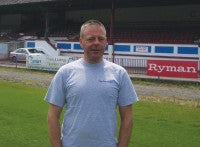 "If I were just the groundsman, I could plead hammer and tongs for this, that and the other"
"If I were just the groundsman, I could plead hammer and tongs for this, that and the other"
Simon Rudkins, Head Groundsman, Hastings United
The Battle of Hastings is etched on every Englishmans' mind: 1066 and all that. It actually took place over six miles from the south coast resort, but there is a battle every year these days in the town itself - to keep its football club afloat. Hastings United just managed to hang on to its Ryman Premiership status last season. A single point kept it from relegation. This is the bedrock of the game, life on the edge. If you are a fan of Hastings United, you mean it. You are a true fan. There's no glamour, no Europe beckoning, just a patient bedside vigil with maybe a back of the mind dream that your club might just 'do a Wimbledon' and end up beating Liverpool in a Wembley final.
One such fan is Simon Rudkins. He's Hastings United through and through, always has been, since moving to the town over ten years ago. No boyhood climbing on a Manchester United or Chelsea bandwagon for him. His loyalty and practical involvement is like few others in football, and this has led to a rare double-act on and off the pitch.
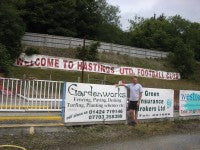
At the age of twenty-eight Simon made a career changing decision. Tired of office work, and yearning for the outdoor life, he embarked on a BTech National Certificate course in amenity horticulture at Plumpton College near Brighton. Ten years later, as well as running his own successful landscaping business, he is a director of the football club he loves, and now its award-winning groundsman to boot. You don't get much more outdoors than that.
The Hastings United ground is called the Pilot Field. Along one side it is a natural amphitheatre and it has one very distinctive feature, the pitch area being surrounded by the remnants of a cinder speedway track, which ceased operation over forty years ago. When I was invited to visit and meet Simon earlier this summer, I had this notion that it had been named after a local World War 1 fighter ace or a pioneering aeronaut who had landed there after an epic flight. Sadly no: it was so-called simply because what was once a farm close by grew a type of oat called pilate, which was used as animal fodder. Hence, the loose derivation of the word pilot, so it is very much a result of local speak rather than anything more dramatic.
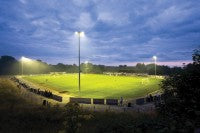 The Pilot Field is owned by Hastings Borough Council, and the football club leases the pitch and all the stands and is responsible for overall day-to-day upkeep. The club has no actual training facilities. It all has to be done on the pitch itself adding, potentially, to upkeep headaches. Not a bit of it, because although the club's last end of term report read '18th, could do better', as far as its pitch is concerned it is unsurpassed in Ryman league ranks.
The Pilot Field is owned by Hastings Borough Council, and the football club leases the pitch and all the stands and is responsible for overall day-to-day upkeep. The club has no actual training facilities. It all has to be done on the pitch itself adding, potentially, to upkeep headaches. Not a bit of it, because although the club's last end of term report read '18th, could do better', as far as its pitch is concerned it is unsurpassed in Ryman league ranks.
When, three seasons ago, the club was left without a groundsman there was only one man who was going to step into the breach, its biggest fan and member of the board. Simon was already a serial volunteer for hands-on duties. He had been for years since being a match day steward with all the attendant tidying up tasks, emptying the refuse bins, cleaning the toilets and such like. When the current owner, Dave Walters, bought the club he could see that Simon was a rare asset even though, at that stage, he was just a supporter. If something needed to be done, he could rely on Simon to do it. When the match programme editor left, who else but Simon took up the reins? Three years on from that, he was asked to be a director of the club - definitely an offer he couldn't refuse. This was five years ago and before he had any ideas of being a groundsman.
For the job of keeping the Pilot Field pitch in order, however, it was more than merely enthusiasm that made him do it: he did have some credentials, his landscaping 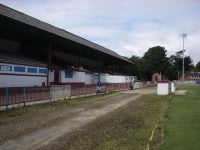 business gave him a decent level of know-how. Also, Simon says that if he sees something wrong with anything to do with the environment, he has to put it right. It's both a good and bad trait he admits. He just couldn't bear the idea of the Hastings pitch deteriorating, so saying "I'll do it" came naturally to him.
business gave him a decent level of know-how. Also, Simon says that if he sees something wrong with anything to do with the environment, he has to put it right. It's both a good and bad trait he admits. He just couldn't bear the idea of the Hastings pitch deteriorating, so saying "I'll do it" came naturally to him.
Simon's responsibilities as a Hastings United director were specifically in connection with spectator facilities, ground health and safety matters and, in particular, that ground grading was up to scratch. The latter, of course, included the state of the playing surface. He had been helping out the previous part time groundsman now and again and, when the club parted company with him three years ago, he simply filled the void by taking on the whole of the job. The extraordinary thing is that, up until that moment, he had never used a piece of turf care kit.
For three seasons now he has been in charge of pitch care at Hastings and, this summer, collected an FA award for the results of his work: a meteoric rise in anyone's book.
Simon admits that previously he really had no idea how much time was needed to prepare a pitch. He soon discovered that two or three hours before kick-off, cutting and marking didn't begin to cover it. His natural inclination that, 'if something wasn't quite right to see that it is' took over. A quest for perfection began.
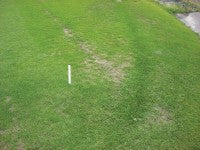 He had had no formal turf training and learned things very much as he went along, picking up tips from all manner of sources. The best of these, he says, is the Pitchcare forum, and he's a regular visitor. Simon is entirely self-taught, but says he's gained so much knowledge from trade contacts, the most significant of these being Andy Russell at Headland Amenity.
He had had no formal turf training and learned things very much as he went along, picking up tips from all manner of sources. The best of these, he says, is the Pitchcare forum, and he's a regular visitor. Simon is entirely self-taught, but says he's gained so much knowledge from trade contacts, the most significant of these being Andy Russell at Headland Amenity.
"There's maybe a bit too much emphasis on science these days when it comes to pitch care," says Simon. "All that's really needed is a practical approach and attention to detail. Andy's been very helpful in this regard."
"I've noticed in the last twelve months how switching to using a slow release fertiliser has given the pitch much more even growth around the calendar. Drainage conditions here are pretty good anyway, but consistent grass cover means I seldom get problems with surface water."
Money is tight at this level of football for all clubs. Hastings is no exception. Survival is the abiding watchword. Simon's situation is an interesting one: he has a foot in both camps when it comes to budgeting and spending. Groundsmen, especially in these lower echelons, can be seen as a club servant always having to go 'cap in hand' when it comes to kit or materials. So which cap does Simon wear?
"Obviously, I do know how restricted things are financially so, in that sense, it's easier for me to be realistic, but it is harder now knowing just what it takes to do the job properly," he says.
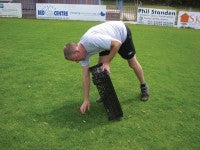 "If I were just the groundsman, I could plead hammer and tongs for this, that and the other."
"If I were just the groundsman, I could plead hammer and tongs for this, that and the other."
The kit is limited, to say the least, so it's all the more remarkable how good the pitch is and that its custodian received an FA accolade. Playing the lead week in week out is a Ransomes Mastiff, now over twenty years old. When I visited, Simon had it cutting handsome swathes and the pitch looked a picture. No need for a kit change here it seems.
The prolonged spring drought meant that the pitch did suffer towards the end of the season. There are no irrigation facilities and Simon has to lug around hyper-flex hoses with sprinkler attachments to do the job. Admittedly, in June when I visited, there had by then been some meaningful rainfall, but no doubt Simon's hard work, watering daily since the end of March, had kept the grass flourishing through the dry spell.
About a year ago, the rear axle went on an ageing Westwood tractor, an all round workhorse. It was irreparable, so a new John Deere garden tractor was bought for duties such as pulling a light roller.
As part of its leasing arrangement, Hastings Borough Council handle annual reseeding, and this is carried out as soon as the season is concluded in early May. This is the council's only involvement. Simon hadn't been happy with the seed the council had been using, so part of the budget for the pitch was used up by switching to a new DLF pe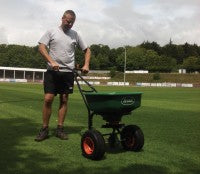 rennial ryegrass mixture - Pro Master 79 - for the major reseed and, after just six weeks since sowing, when I visited, the results were clearly very impressive. He'd already been using the mixture for overseeding repairs throughout the season and found it worked well with the clay-based conditions, germinating very readily
rennial ryegrass mixture - Pro Master 79 - for the major reseed and, after just six weeks since sowing, when I visited, the results were clearly very impressive. He'd already been using the mixture for overseeding repairs throughout the season and found it worked well with the clay-based conditions, germinating very readily
For aeration refurbishment, Simon calls in specialist contractor Peter Mannington based at Robertsbridge. At the end of the past season, Simon sourced sand from a supplier called Construction Materials, and Peter came to the ground with his spreader and vertidrain. It is a more than satisfactory arrangement, well worth it, and well within budget.
Areas where Simon's directorial hat comes to the fore are fertilising and weed control. He decided, some time ago, to do it himself, using his own new spreader. It takes longer, but it works and saves the club money. It's where the crossover from the day-job really pays off. Simon runs his business, Gardenworks, from his home in St Leonards, so he's nearby and has some of the tools of the trade, like his Scotts spreader. I'm always just a phone call away, as Simon puts it. He used Headland Amenity's Blaukorn 15:3:20+2MgO+10S plus micronutrients, which has a high potassium content for spring or autumn usage. He had recently applied the company's Multigreen 28:3:15+2MgO and already had stored Multigreen 15:0:22 for application in Autumn.
 He reckons that, during the playing season, his average time spent on pitch work during a single week is about sixteen hours - and he does it all for love. Club Chairman Dave Walters did offer to pay him but, with his pecuniary interests in the club in mind, Simon said he'd rather know that if he really needed something to do a decent job on pitch upkeep, he'd get it.
He reckons that, during the playing season, his average time spent on pitch work during a single week is about sixteen hours - and he does it all for love. Club Chairman Dave Walters did offer to pay him but, with his pecuniary interests in the club in mind, Simon said he'd rather know that if he really needed something to do a decent job on pitch upkeep, he'd get it.
His FA award says it's a deal that seems to be suiting all parties. Minimum outlay: maximum result. The irony is Simon's business, Gardenworks, is a business partner of the club, so paying for advertising around the ground and the match programmes means he goes part way to paying for the pitch work he does himself for nothing. He assures me that he pays the full rate: no favours for being a director!
The trophy for pitch excellence, which Simon was looking forward to receiving at the new season's kick-off game against an Arsenal XI, is no freebie, no fluke. It is the result of cumulative match-by-match scores awarded to the pitch over a whole season by the match referees. The top nominees in respective league sections are then visited by Premier League groundsmen and their pitches assessed. Simon says Tottenham and West Ham custodians came to the ground towards the end of March. They didn't give much away, he says. He just hoped he might improve on the previous season's third place.
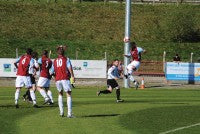 A few weeks after this visit, a letter from the FA advised him that he was number one in the Ryman League and second overall in levels 3 and 4 of the non-league game: that's 200 or so clubs from nine separate divisions in the Southern, Northern and Isthmian Leagues.
A few weeks after this visit, a letter from the FA advised him that he was number one in the Ryman League and second overall in levels 3 and 4 of the non-league game: that's 200 or so clubs from nine separate divisions in the Southern, Northern and Isthmian Leagues.
Half way through last season a new manager, Jason Hopkinson, took over team matters. He had been a coach at Brighton and Hove Albion and, according to Simon, is the first man at the helm, in his time as director or groundsman, with a real appreciation and understanding of the importance of a decent pitch. In the past, no one from the playing side had given him the impression that they really cared about the pitch or how it was looked after.
Simon thinks the coming season will be an interesting one. He's optimistic that the team will improve on their get out of jail performance last season, but income from supporters and promotional partners has declined over the past twelve months due, he feels, to the effects of the recession. I put it to him that Hastings is a town on the up with a new university in the offing and more of an up beat buzz about its seaside status. He agreed that there were grounds to be optimistic of a spin off in time, but the director in him was putting a cautious veil over this for the time being.
This coming season will be tough financially, he told me, not least because there is no main sponsor in place. His FA award is sure to attract a lot of attention locally, and may just be a turning point in this particular Battle of Hastings.
